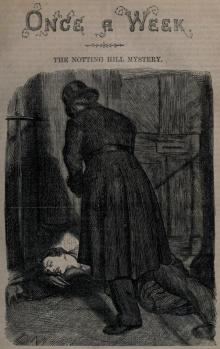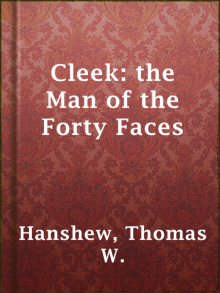- Home
- Charles Felix
Cleek: the Man of the Forty Faces Page 5
Cleek: the Man of the Forty Faces Read online
Page 5
CHAPTER II
"About me, Mr. Cleek?"
"Yes. You spoke about there being a change in your circumstances--spokeas though you thought I knew. I do not; but I should like to if I may.It will perhaps explain why you are out alone and in this neighbourhoodat this time of night."
"It will," she said, with just a shadow of deeper colour coming into hercheeks. "The house you saw me coming out of is the residence of a friendand former schoolmate. I went there to inquire if she could help me inany way to secure a position; and stopped later than I realised."
"Procure you a position, Miss Lorne? A position as what?"
"Companion, amanuensis, governess--anything that," with a laugh and ablush, "'respectable young females' may do to earn a living when theycome down in the world. You may possibly have heard that my uncle, SirHorace, has married again. I think you must have done so, for the paperswere full of it at the time. But I forget"--quizzically--"you don't readnewspapers, do you, even when they contain accounts of your owngreatness."
"I wonder if I deserve that? At any rate, I got it," said Cleek with alaugh. "Yes, I heard all about Sir Horace's wedding. Some four or fivemonths ago, wasn't it?"
"No, three--three, last Thursday, the fourteenth. A woman doesn't forgetthe date of her enforced abdication. The new Lady Wyvern soon let meknow that I was a superfluous person in the household. To-day, I came tothe conclusion to leave it; and have taken the first actual step towarddoing so. A lucky step, too, I fancy; or, at least, it promises to be."
"As how?"
"My friend knows of two people who would be likely to need me: one, atitled lady here in England, who might be 'very glad to have me'--I amquoting that, please--as governess to her little boy. The other, a youngFrench girl who is returning shortly to Paris, who also might be 'gladto have me' as companion. Of course, I would sooner remain in England,but--well, it is nicer to be a companion than a governess; and the younglady is very nearly my own age. Indeed, we were actually at the sameschool together when we were very little girls."
"I see," said Cleek, a trifle gloomily. "So then it is possible that itwill, eventually, be the young French lady and--Paris, in future. When,do you fancy? Soon?"
"Oh, I don't know about that. I haven't quite made up my mind as yetwhich of the two it will be. And then there's the application to be sentafterwards."
"Still, it will be one of the two certainly?"
"Oh, yes. I shall have to earn my living in future, you know; so,naturally, of course--" She gave her shoulder an eloquent upwardmovement, and let the rest go by default.
Cleek did not speak for a moment: merely walked on beside her--a ridgebetween his eyebrows and his lower lip sucked in; as if he were mentallydebating upon something and was afraid he might speak incautiously. Butof a sudden:
"Miss Lorne," he said, in a curiously tense voice, "may I ask yousomething? Let us say that you had set your heart upon obtaining one orthe other of these two positions--set it so entirely that life wouldn'tbe worth a straw to you if you didn't get it. Let us say, too, thatthere was something you had done, something in your past which, ifknown, might utterly preclude the possibility of your obtaining what youwanted--it is an absurd hypothesis, of course: but let us use it for thesake of argument. We will say you had done your best to live down thatoffensive 'something' done, and were still doing all that lay in yourpower to atone for it; that nobody but one person shared the knowledgeof that 'something' with you, and upon his silence you could rely. Nowtell me: would you feel justified in accepting the position upon whichyou had set your heart _without_ confessing the thing; or would you feelin duty bound to speak, well knowing that it would in all humanprobability be the end of all your hopes? I should like to have youropinion upon that point, please."
"I can't see that I or anybody else could have other than the one," shereplied. "It is an age-old maxim, is it not, Mr. Cleek, that two wrongscannot by any possibility constitute a right? I should feel in dutybound, in honour bound, to speak, of course. To do the other would be toobtain the position by fraud--to steal it, as a thief steals things that_he_ wants. No sort of atonement is possible, is even worth the name, ifit is backed up by deceit, Mr. Cleek."
"Even though that deceit is the only thing that could give you yourheart's desire? The only thing that could open the Gates of Heaven foryou?"
"The 'Gates of Heaven,' as you put it, can never be opened with a lie,Mr. Cleek. They might be opened by the very thing of which youspeak--confession. I think I should take my chances upon that. At anyrate, if I failed, I should at least have preserved my self-respect anddone more to merit what I wanted than if I had secured it by treachery.Think of the boy you helped a little while ago. How much respect willyou have for him if he never lives up to his promise; never goes toClarges Street at all? Yet if he does live up to it, will he not bedoubly worth the saving? But please!" with a sudden change fromseriousness to gaiety, "if I am to be led into sermonizing, might I notknow what it is all about? I shall be right, shall I not, in supposingthat all this is merely the preface to something else?"
"Either the Preface or--the Finis," said Cleek, with a deeply drawnbreath. "Still, as you say, no atonement is worth calling an atonementif it is based upon fraud; and so--Miss Lorne, I am going to ask you toindulge in yet another little flight of fancy. Carry your mind back,will you, to the night when your cousin--to the night two years ago whenSir Horace Wyvern's daughter had her wedding presents stolen and you, Ibelieve, had rather a trying moment with that fellow who was known as'The Vanishing Cracksman.' You can remember it, can you not?"
"Remember it? I shall never forget it. I thought, when the police randown stairs and left me with him, that I was talking to Mr. Narkom. Ithink I nearly went daft with terror when I found out that it was he."
"And you found it out only through his telling you, did you not?Afterward, I am told, the police found you lying fainting at the foot ofthe stairs. The man had touched you, spoken to you, even caught up yourhand and put it to his lips? Can you remember what he said when he didthat? Can you?"
"Yes," she answered, with a little shudder of recollection. "For weeksafterward I used to wake up in the middle of the night thinking of itand going cold all over. He said, 'You have come down into Hell andlifted me out. Under God, you shall lift me into Heaven as well!'"
"And perhaps you shall," said Cleek, stopping short and uncovering hishead. "At any rate, I'll not attempt to win it by fraud. Miss Lorne, Iam that man. I am the 'Vanishing Cracksman' of those other days. I'vewalked the 'straight path' since the moment I kissed your hand."
She said nothing, made no faintest sound. She couldn't--all thestrength, all the power to do anything but simply stand and look at himhad gone out of her. But even so, she was conscious--dimly but yetconscious--of a feeling of relief that they had come at last close tothe end of the heath, that there was the faint glow of lights dimlyobservable through the enfolding mist, and that there was the rumble ofwheels, the pulse of life, the law-guarded paths of the city's streetsbeyond.

 The Notting Hill Mystery
The Notting Hill Mystery Cleek: the Man of the Forty Faces
Cleek: the Man of the Forty Faces